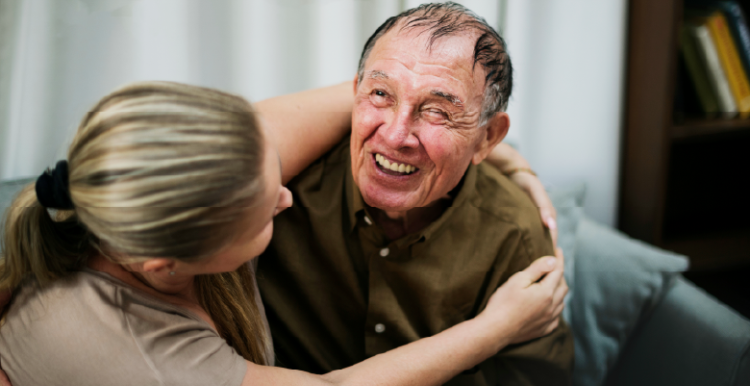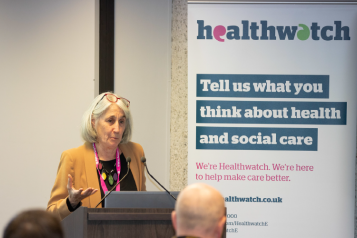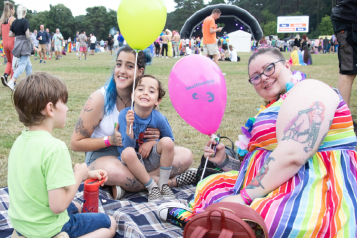Dementia Action Week: 17–23 May

What is Dementia Action Week?
It is a designated week to raise awareness and help improve the lives of people affected by dementia, whether you are the sufferer, partner, child, friend, carer or sibling.
In 2019, 66,424 (12.5%) of registered deaths in England and Wales were due to dementia and Alzheimer’s disease and this continues to rise due to people living longer. Behind all those 66,424 sufferers of the disease there is a relative or friend who are suffering in a different way. Nearly a million families around the UK are trying to give dignified care to their loved ones but are struggling financially.
"While dementia isn’t curable yet, the care system is."
Emerald’s experience
“My Grandma, Jacqueline, was an extremely intelligent and loving lady whose career revolved around caring, from nursing to a carer and later a volunteer for Dorset County Hospital. You always knew you were in safe hands when you were in her presence as she took care of not only her family but her patients as well.
“My Grandma was adored by her husband and she adored him back, so when he died 20 years ago, normality as she knew it completely changed. From then on, she was never quite the same, being prescribed antidepressants and not wanting to sleep in the bed she could no longer share with her husband. Lack of sleep and care for herself was beginning to take its toll. She lost that vivacious love for life that she once had.
“This didn’t go unnoticed by my family and a few more cracks started to show. She continued to make two cups of tea every morning for herself and my Grandad, she wore her trousers inside out, put baked beans in the kettle, left food in the oven forgetting it was there and buying plants that went neglected. These symptoms are not like forgetting your neighbour’s name or where you put your car keys which so often comes to mind when people hear the words dementia or Alzheimer’s.
“It rapidly got worse and trying to juggle school and work with 24/7 supervision just to make sure she was eating and getting dressed was becoming too demanding when she lived on her own. Not only was it a weight on our shoulders every day, we would anticipate what state we may find her. Grandma began to have intense and violent hallucinations and if these occurred when she was alone, she became a hazard to herself by wandering the streets at night with no idea of where she was. The police became involved and advised us to contact our local mental health care team who confirmed that a care home was now necessary for her own safety. There was no alternative and the decision was taken out of our hands.
“The cause of all these symptoms was the Lewy bodies variant of Alzheimer’s disease. This variant is the least common type of Alzheimer’s, only accounting for 10-15% of all cases. It is very closely related to Parkinson’s disease and in my Grandma’s case, was wrongly diagnosed at first to be just Alzheimer’s. Lewy bodies are proteins that grow in the nerve cells, disrupting their important chemical messages between other nerve cells which eventually causes them to die. Because the proteins can grow in any part of the brain, the disease becomes unique to each individual.
“As a family we didn’t want my Grandma to be placed into a home, but between us we would visit every day. We would try and provide as much stimulation as we could, but sadly much of our time was spent concerned with the inadequacies of carers and their ability to provide basic care. Listening to John Denver and Neil Diamond used to always bring a smile to her face and a few moments when her agitated expressions eased.
“We would take her out into the sun and her pleasured expression would tell us that’s just what she’d been wanting all day. Facial expressions and the tight grip of her hands were beginning to become the only source of communication she could use, especially after a fall resulting in a hip replacement which accelerated her deterioration.
“The lack of after care was devastating. Trying to help my Grandma live with any kind of dignity was becoming a lot harder and we felt like we were hitting our heads against a brick wall. Issues that my family and I noted from our personal experience was: staff having a lack of care home support or time to provide basic care; underqualified staff having to step in; only ticking boxes on a form rather than caringly completing a job; treating all residents the same rather than meeting personal needs and activities not being all inclusive due to the lack of time and funds available.
“Now the point of sharing my experience is not to scare or be negative; aging is inevitable for us all and it starts at different ages. My Grandma was 70 when she was diagnosed, an age for many people where retirement happens and to reflect on the life you’ve had and the things you’ve achieved, or to tick those things off your wish list that you haven’t quite done yet.
“By removing the taboo around dementia and Alzheimer’s and making more people aware of the importance of early diagnosis, a functioning care system, appointing the power of attorney, your family members can get the chances that my Grandma didn’t.
“My Grandma, also known as ‘Queen Jacqueline’ to her carers, passed away in December 2019 before the coronavirus pandemic turned our world upside down. Every single one of us has been affected by the pandemic - and Alzheimer’s and dementia research is no different. Research funding has gone down by 60% so please consider helping where possible as dementia and Alzheimer’s doesn’t discriminate. I will now create her a legacy by raising awareness of her disease and continuing to remember her as the vibrant and loving woman she was before her diagnosis.”
Local resources
If you have any concerns about yourself or someone you know having symptoms of dementia or concerns over dementia care, some steps you can take are:
- Contacting the National Dementia Helpline: 0300 222 11 22
- Contacting a local support group such as Step Ahead, Dementia Action Alliance or Growing Compassionate Communities.
- Attending memory cafes, music and singing.
- For more guidance and links to the listed services please visit Carer Support Dorset
If you would like to share your experience as a family carer of someone with dementia, please visit the X page Butterfly Buttons.
We thank Emerald for her contribution towards this article.
We couldn’t do what we do without our volunteers, whether that be collecting feedback or raising awareness. If you would be interested in writing an article for us about a subject that is close to your heart please contact us.


